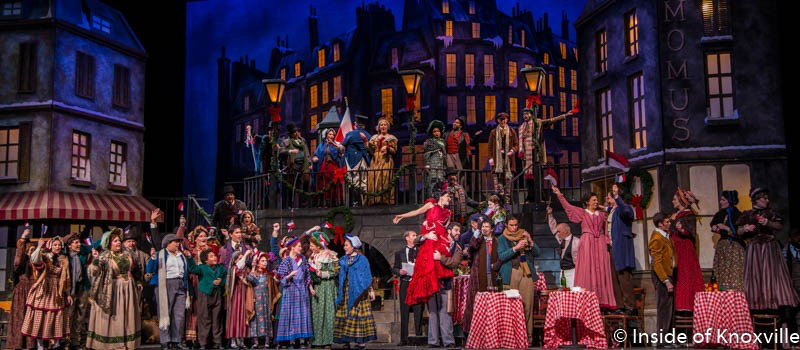Infused with cold medicine and lulled into a sense of security by cough lozenges so as not to compete with poor consumptive Mimi, I entered the Tennessee Theatre last weekend with definite expectations for a La Bohème from Knoxville Opera—an opera that had been absent from Knoxville stages for 10 years, almost to the day. Expectations, though, can be perilous for opera-goers, particularly if one is confining the work narrowly to either vocal or dramatic pigeonholes. Puccini’s La Bohème has always worked best as a theatrical fusion of the two—and that is exactly why this Knoxville Opera production was so successful.
Jessica Rose Cambio and Richard Troxell made for an excellent Mimi and Rodolfo, their romantic meeting engaging, romantic, and as believable as Puccini allows. Cambio sang Mimi with a lovely clarity and full high end, yet with a refined delicacy that was entrancing. Her Act III aria, “Donde lieta usci,” in which she asks Rodolfo to return her few possessions, was soft and poignant. Troxell sang and portrayed Rodolfo with confidence and strength, using his experience to dictate just how to navigate and present Puccini’s high notes. Troxell created a Rodolfo whose boldness was wracked by romantic indecision, a dimension of character quite welcome in its added complexity.
Baritone Craig Verm, making a Knoxville Opera debut, was a standout as Marcello, the painter and Rodolfo’s fellow impoverished Bohemian. Verm’s beautifully lyrical voice fell like velvet over the audience on a number of occasions and he carried the quasi-comedic/dramatic mix of the character with energy and a solid well-thought out focus.
The role of Marcello’s on-again-off-again girlfriend, Musetta, was carried with vivaciousness by Julia Lima, last seen by KO audiences in last season’s Mefistofele. Her Act II Cafe Momus seduction, “Quando m’en vo’ “, was brilliantly provocative and sung with a clarity that demanded attention.
The Act II Cafe Momus crowd and street scene was a tour de force for Knoxville Opera stage director, Brian Deedrick, who packed an amazing amount of energy, color, and movement into the action via a stage band and all manner of crowd business. The key to the scene, though—missing in this case—was a balancing of the magnificent diversity of visual background with the foreground action that allows Musetta’s energy, Marcello’s jealousy, and the side story of Musetta’s elderly gentleman, Alcindoro (James Eder), to play without being obscured or upstaged.
Adding strength to the Bohemian antics in the garret scenes were Peter Johnson as Schaunard and Adam Cioffari as Colline. Cioffari gave his Act IV “Vecchia zimarra”, a touching goodbye to his beloved overcoat, a wonderful poignancy.
KO executive director Brian Salesky led the Knoxville Symphony Orchestra with his usual devotion to both crispness and vivid theatricality.
[Photo courtesy of InsideofKnoxville.com]





